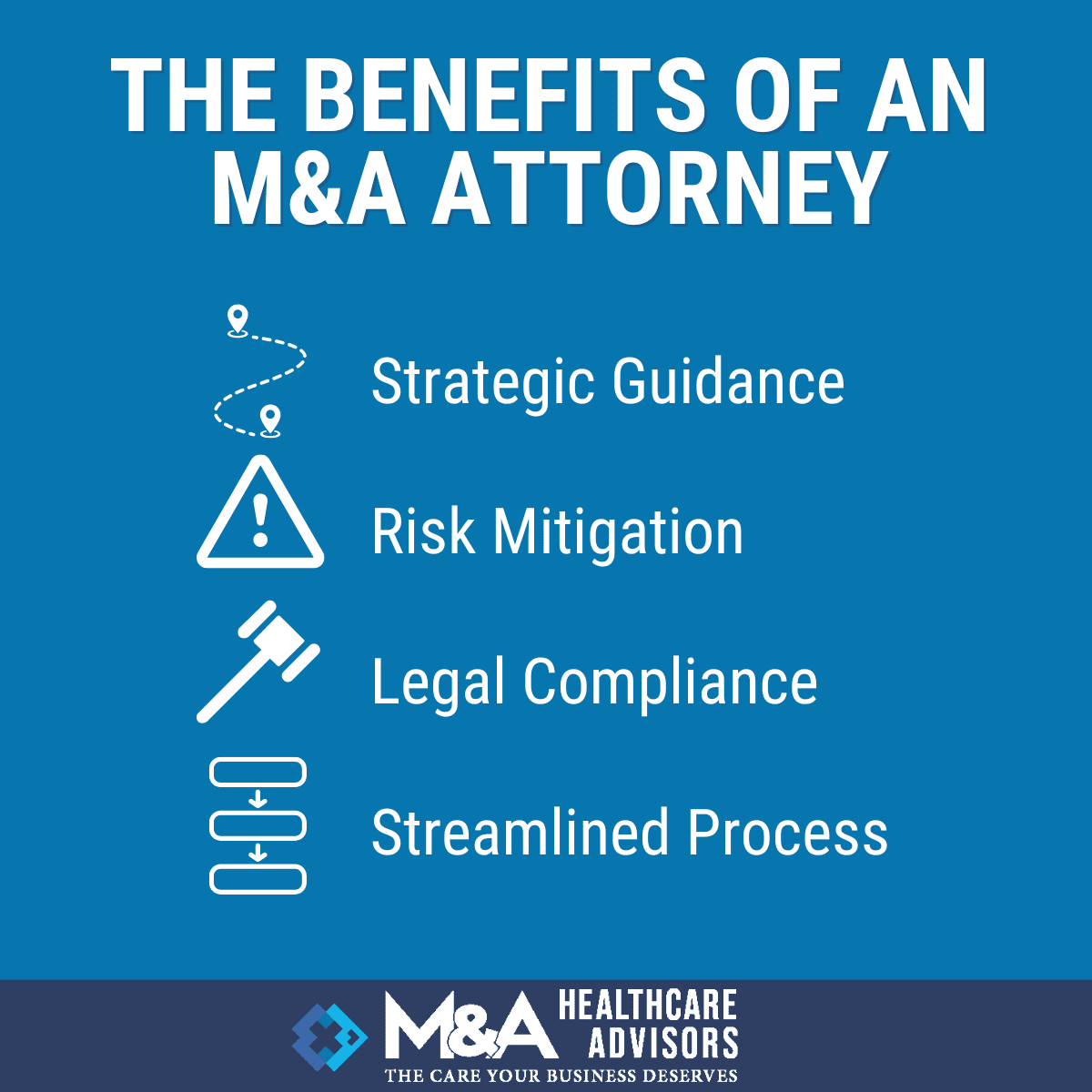As a continuation of our Transaction Support Team series, vital to achieving a successful outcome is the early involvement of an experienced M&A Attorney. An M&A process requires a considerable amount of legal support, and without an attorney to assist in the facilitation of contracts, negotiation of terms, and troubleshooting of potential roadblocks, a seller risks the possibility of experiencing a failed process.
In this article, we intend to address the main role and contributions of a transactional attorney, as well as how to identify and choose legal representation.
The Role of an Attorney in a Transaction
M&A Attorneys contribute more to a transaction than simply reviewing the purchase agreement. They provide important legal guidance and negotiation assistance throughout the entire sell-side process. At the highest level, the primary responsibility of legal counsel is to mitigate their client’s risk throughout (and after) the transaction.
An experienced transactional attorney should provide support in the following area:
- Letter of Intent (LOI) Review
A Letter of Intent (LOI) is a non-binding document that outlines the intentions and terms proposed by a prospective buyer. An Attorney’s involvement in the LOI stage will mitigate a seller’s post-acquisition liability, by ensuring that the buyer and seller are on the same page as it pertains to specific terms that will be further defined in the Purchase Agreement. - Strategic Guidance
Identifying and assessing the risks associated with a prospective transaction is a significant responsibility of a transactional attorney. They offer guidance from their previous M&A experience by identifying potential roadblocks that could come about in due diligence. An experienced attorney should assist in troubleshooting these roadblocks to ensure that proposed deadlines are met by both parties. - Seek necessary regulatory approvals
In healthcare M&A, regulatory approvals can cover a wide range, from federal, state, and local government approvals to meeting industry-specific regulations. This process can quickly become convoluted due to issues like cross-state transactions and conflicting regulations between government agencies. Having an attorney with an understanding of the legal and regulatory landscape can help to save time and more effectively navigate the varied regulatory landscape of healthcare. - Definitive Documents and Post-Deal Guidance
A transactional attorney’s contributions culminate in the drafting, negotiation, and execution of a deal’s definitive documents (including the purchase agreement and any relevant employment contracts). By having an attorney that was intricately involved in the LOI negotiation process, they can more effectively assist with the drafting and finalization of the purchase agreement, which reflects many of the terms initially outlined in the LOI.
Additionally, in anticipation of a closed transaction, a seller’s attorney can assist in identifying and protecting against any post-transactional liabilities, including escrow terms, earn-outs, rollover equity, and any reps & warranties terms.
The net effect of an attorney’s early involvement is a streamlined M&A process in which legal costs are minimized and momentum is maintained throughout the diligence process. Without proper legal guidance and support, unnecessary time can be wasted. The more time that lags between parties, stages in the process, and deliverables, the more likely it is for a transaction to fall out.
Identifying an Experienced M&A Attorney
Simply put, not all attorneys are equipped to handle M&A transactions. Your legal representation should ideally have direct healthcare M&A experience they can reference during the vetting process.
Legal Areas of Concern
The ideal M&A attorney should be well-versed in multiple legal areas:
- Corporate law, including all types of corporate deal structures
- Tax laws and regulations, including corporate and capital gains taxes
- Securities laws and regulations, which are ever-changing
- Contract law, critical to negotiating and drafting agreements specific to the deal
- Employment law concerning areas like employee transfers, labor relations (including if the workforce is unionized), benefits, and pay scales
- Intellectual property laws, including legal ownership and rights, representations, etc.
- Property law, with a focus on asset ownership
Your attorney needs knowledge and expertise in areas specific to the healthcare industry, with an emphasis on regulatory and compliance-based laws. These areas can include maintaining patient data confidentiality, HIPAA compliance, compliance with state or federal healthcare laws and regulations, and transferring contracts & licenses.

From valuing your company to closing the deal, legal advisors play a crucial role in mitigating risks and enhancing communication between all parties involved.
Nuances of a Deal
The healthcare industry can span a wide range of services businesses, each with their own nuances of compliance. The breadth and depth of a transactional attorney's knowledge of the lower-middle market and the healthcare industry is essential to a deal’s success.
- Risk Assessment
When an investor is interested in your company, they rely on the due diligence process to confirm your business is as it was represented to them prior to submitting an offer. It is an intense, rigorous process that can result in unforeseen issues, even when the pre-sale preparation for your company has been as thorough as possible. An attorney assists the deal team in understanding and addressing the risks from both the seller and buyer’s perspectives and to identify issues before they derail a transaction entirely. - Deal structure
Transactions typically fall into one of two categories: asset or stock purchases. Buyers will propose a deal structure in their LOI, based on specific incentives, and it is the role of each party’s legal counsel to assist in finalizing the proposed deal structure. Additionally, the deal structure will influence the transitioning of staff, capital, contracts, licenses and will have tax ramifications. A competent attorney will assist in interpreting and understanding the ramifications of either structure for a seller.
Pivotal Role of a Transactional Attorney
Bringing an M&A process to a successful conclusion is a team effort. The process can get tedious, complex, and is often fraught with issues. An attorney who is an expert in M&A, especially with direct experience in healthcare, can assist in streamlining the entire process. Having an experience attorney on the transaction team can lead to:
- Establishing clear objectives and priorities for negotiations
- Enhancing communication between the negotiating parties through clarification of legal and other issues
- Providing regular updates to all parties to establish and maintain an efficient and transparent process
- Anticipating potential legal issues so they do not obstruct the process
- Streamlining document preparation as a working team member
- Identifying new risks as they develop so they can be addressed quickly
Although an attorney is not involved in every aspect of a due diligence process, the attorney's role is critical to transaction success. An experienced M&A Advisor can provide preliminary guidance and review of contracts, but a M&A Advisor is not the same as a transactional attorney. The Transactional Team needs experienced legal support to ensure clients are protected after a transaction has occurred and to support a seamless and secure deal.
Choosing a seasoned transactional attorney is one of the most critical decisions made when a seller decides to embark on a sale process. Their familiarity with the cadence of the process and the language within definitive documents will enhance your team's effectiveness and minimize the time spent negotiating legal provisions. Just as important to a seller’s success is having an experienced M&A Advisor that can ensure a seller identifies and reaches their M&A goals.
M&A Healthcare Advisors has proven success in the M&A process. Our experienced team understands the healthcare industry and can position your business to achieve a successful outcome. Contact us to discuss your needs with an M&A advisor.



